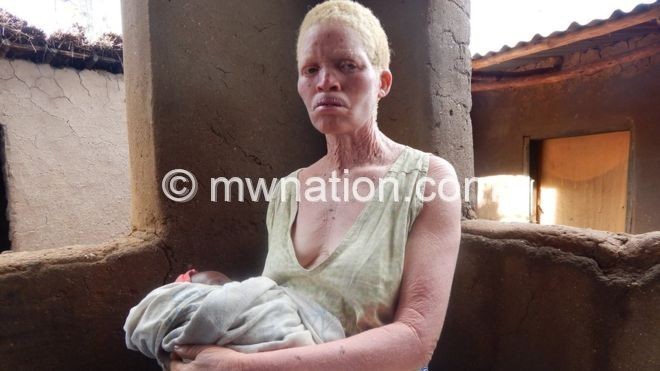Justice delayed isn’t just
In January 2015, unknown assailants beheaded a seven-year old boy with albinism in Mpakati Village, Machinga, and vanished with his head.
The gruesome murder of Harry Mokoshoni sent shock waves throughout Traditional Authority Chikwewo’s area at the height of killings of persons with albinism.

Four years on, the matter is still in court—personifying the country’s slow march to tackle the attacks on the endangered population estimated at 134 000, according to 2018 census.
“To our disappointment, there is no visible progress in the murder case still in court,” laments the deceased’s mother, Edna Sydreck.
Machinga has become the epicentre of the killings in which a sibling, Catholic priest, clinician and police officer were detained and found with a case to answer in the murder of McDonald Masambuka, 22, last year.
The family of Masambuka, whose body was found buried in a crop field nearly a month after he had disappeared, continues to wait for justice.
Machinga Police Station spokesperson Davie Sulumba said the district in the Eastern Region has recorded 23 cases of attacks on people with albinism since 2015.
“They include murder, abductions and illegal possession of human tissue,” he says.
The attacks are not only confined to Machinga. According to human rights defenders at Amnesty International, 148 cases have been reported countrywide since 2014. They include 23 murders.
“Persons with albinism deserve to see justice for the crimes against them,” says Amnesty regional director for Southern Africa, Deprose Muchena. “That it takes so long for cases to be investigated or heard in court is a sobering indictment of the systematic failures in Malawi’s criminal justice system.”
The courts have concluded only two murder cases.
Amnesty urges government to fast-track the cases still in court and crack down on the market for body parts.
“The Malawian authorities must ensure that persons with albinism no longer live in fear of organised criminal gangs who prey on their body parts,” said Muchena.
However, three of four inquiries done on the prevailing attacks have failed to establish the existence of a market for albino parts.
Since 2016, investigations commissioned by the United Nations Children’s Fund (Unicef), Department of Disability and Elderly Affairs, Malawi Human Rights Commission and the Joint Parliamentary Committee did not trace any market for the illicit trade in body parts.
The search for the market at the heart of the ritual killings is at the centre of the work of the Commission of Inquiry appointed by President Peter Mutharika to investigate the killings and abductions.
The commission, which has failed to meet the April 30 deadline, has asked for an extension to June 30.
Overstone Kondowe, the former president of the Association of People with Albinism in Malawi (Apam), is concerned that not much has changed despite several initiatives to end the criminal attacks
He reckons the continued attacks could be a result of the justice system’s delays and failure to penalise offenders and deter would-be offenders.
“The court cases are progressing at a snail’s pace. It is sad to see that only two murder cases are concluded since 2014. To us, we see that there is lack of political will to end the attacks and protect persons with albinism,” he says.
Government however, insists that it is doing all it can to ensure safety for every person, including those with albinism.
Former minister of Homeland Security Nicholas Dausi told The Nation that there is need for several approaches to overcome the problem while also waiting for court cases to be concluded. He blamed some government critics for politicising the issue.
“What we need are multi-sectoral efforts to end the vice. Government has already started engaging religious groups, community leaders and the general public to help fight against the attacks,” he says.
In 2016, government sent then Inspector General of Police Lexter Kachama and other officials to Tanzania to learn how the east African country eliminated similar attacks on persons with albinism.
Last year, government adopted a national action plan to end the attacks.
However, the wheels of justice continue to turn too slow for persons with albinism and the bereaved families. “Justice delayed is justice denied. We want to see the killers punished so that others can learn from them, says Sydreck.





